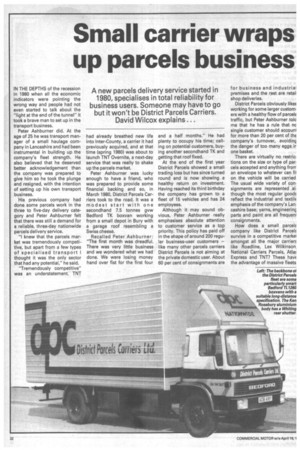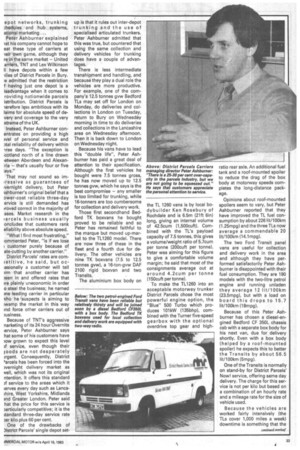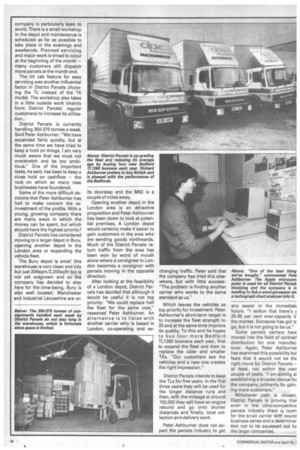Small carrier wraps up parcels business
Page 34

Page 35

Page 36

If you've noticed an error in this article please click here to report it so we can fix it.
A new parcels delivery service started in 1980, specialises in total reliability for business users. Someone may have to go but it won't be District Parcels Carriers. David Wilcox explains . .
IN THE DEPTHS of the recession in 1980 when all the economic indicators were pointing the wrong way and people had not even started to talk about the "light at the end of the tunnel" it took a brave man to set up in the transport business.
Peter Ashburner did. At the age of 25 he was transport manager of a small haulage company in Lancashire and had been instrumental in building up the company's fleet strength. He also believed that he deserved better acknowledgement than the company was prepared to give him so he took the plunge and resigned, with the intention of setting up his own transport business.
His previous company had done some parcels work in the three to five-day delivery category and Peter Ashburner felt that there was still a demand for a reliable, three-day nationwide parcels delivery service.
"I knew that the parcels market was tremendously competitive, but apart from a few types of specialised transport I thought it was the only sector that had any potential," he said.
"Tremendously competitive" was an understatement. TNT had already breathed new life into Inter-County, a carrier it had previously acquired, and at that time (spring 1980) was about to launch TNT Overnite, a next-day service that was really to shake up the parcels market.
Peter Ashburner was lucky enough to have a friend, who was prepared to provide some financial backing and so, in March 1980, District Parcels Carriers took to the road. It was a modest start with one secondhand 7.5 tonnes gvw Bedford TK boxvan working from a small depot in Bury with a garage roof resembling a Swiss cheese.
Recalled Peter Ashburner: "The first month was dreadful. There was very little business and we wondered what we had done. We were losing money hand over fist for the first four and a half months." He had plenty to occupy his time; calling on potential customers, buying another secondhand TK and getting that roof fixed.
At the end of the first year District Parcels showed a small trading loss but has since turned round and is now showing a healthy return on investment. Having reached its third birthday the company has grown to a fleet of 15 vehicles and has 24 employees.
Although it may sound obvious, Peter Ashburner really emphasises absolute attention to customer service as a top priority. This policy has paid off in the shape of around 200 regular business-user customers like many other parcels carriers District Parcels is not aiming at the private domestic user. About 60 per cent of consignments are for business and industrial premises and the rest are retail shop deliveries.
District Parcels obviously likes working for some larger custom. ers with a healthy flow of parcel traffic, but Peter Ashburner tolc me that he has a rule that nc single customer should accouni for more than 20 per cent of thE company's turnover, avoiding the danger of too many eggs ir one basket.
There are virtually no restrictions on the size or type of parcels accepted and anything frorr an envelope to whatever can fi1 on the vehicle will be carried The usual wide variety of consignments are represented although the most regular goodE reflect the industrial and textilE emphasis of the company's Lancashire base; yarns, engineering parts and paint are all frequeni consignments.
How does a small parcelE company like District ParcelE survive in a competitive markei amongst all the major carriers like Roadline, Lex Wilkinson, National Carriers Parcels, Atla: Express and TNT? These havE the advantage of massive fleets epot networks, trunking :..hedules and hub systems, ational marketing ...
Peter Ashburner explained at his company cannot hope to eat these type of carriers at leir own game, although they re in the same market — United &tiers, TNT and Lex Wilkinson II have depots within a few iiles of District Parcels in Bury. le admitted that the restriction f having just one depot is a isadvantage when it comes to roviding nationwide parcels istribution. District Parcels is -rerefore less ambitious with its !aims for absolute speed of devery and coverage to the very xtreme of the UK.
Instead, Peter Ashburner conentrates on providing a high .ivel of personal service and Dial reliability of delivery within iree days. "The exception is icotland north of a line drawn ,etween Aberdeen and Alexanlria — that's usually four or five lays."
That may not sound so imiressive as guarantees of ivernight delivery, but Peter ‘shburner's original belief that a comer-cost reliable three-day ervice is still demanded has 'roved correct in the majority of ases. Market research in the iarcels business usually oncludes that customers rank eliability above absolute speed.
"What I find most frustrating," :ommented Peter, "is if we lose customer purely because of ate-cutting by another carrier."
District Parcels' rates are comretitive, he said, but ocasionally a customer will tell rim that another carrier has reen in and offered rates that !re plainly uneconomic in order o steal the business; he named rne leading carrier in particular vho he 'suspects is aiming to ;wamp the market in this way Ind force other carriers out of rusiness.
Because of TNT's aggressive narketing of its 24 hour Overnite ;ervice, Peter Ashburner says hat some of his customers have low grown to expect this level rf service, even though their loods are not desperately agent. Consequently, District 'arcels has been forced into the wernight delivery market as veil, which was not its original ntention. It offers this standard Tf service to the areas which it serves every day such as Lanca shire, West Yorkshire, Midlands )nd Greater London. Peter said hat the price for this service is
)articularly competitive; it is the standard three-day service rate ler kilo plus 60 per cent.
One of the drawbacks of 3istrict Parcels' single depot set up is that it rules out inter-depot trunking and the use of specialised articulated trunkers. Peter Ashburner admitted that this was true, but countered that using the same collection and delivery vehicles for trunking does have a couple of advantages.
There is less intermediate transhipment and handling, and because they play a dual role the vehicles are more productive. For example, one of the company's 12.5 tonnes gvw Bedford • TLs may set off for London on Monday, do deliveries and collections in London on Tuesday, return to Bury on Wednesday morning in time to do deliveries and collections in the Lancashire area on Wednesday afternoon. Then it is back down to London on Wednesday night.
Because his vans have to lead this "double life", Peter Ashburner has paid a great deal of attention to their specification. Although the first vehicles he bought were 7.5 tonnes gross, he has now moved up to 12.5 tonnes gvw, which he says is the best compromise — any smaller is too limited for trunking, while 16-tonners are too cumbersome for collection and delivery work.
Those first secondhand Bedford TK boxvans he bought proved to be reliable and so Peter has remained faithful to the marque but moved up-market to the TL1260 model. There are now three of these in the fleet and a fourth due for delivery. The other vehicles are nine TK boxvans (7.5 to 12.5 tonnes gvw), a 16-ton-gvw DAF 2100 rigid boxvan and two Transits.
The aluminium box body on the TL 1260 vans is by local bodybuilder Ken Rosebury of Rochdale and is 6.5m (21ft 6in) long, giving an internal volume of 42.5cum (1,500cuft). Combined with the TL's payload capacity of 7.5 tonnes, this gives a volume/weight ratio of 5.7cum per tonne (200cuft per tonne). Peter was aiming for this figure to give a comfortable volume margin; he said that most of the consignments average out at around 4.2cum per tonne (150cuft per tonne).
To make the TL1260 into an acceptable motorway trunker District Parcels chose the most powerful engine option, the "Blue" 500 Turbo which produces 101kW (135bhp), combined with the Turner five-speed gearbox with the optional overdrive top gear and high ratio rear axle. An additional fuel tank and a roof-mounted spoiler to reduce the drag of the box body at motorway speeds com pletes the long-distance package.
Opinions about roof-mounted spoilers seem to vary, but Peter Ashburner reported that they have improved the TL fuel consumption by about 226 lit/100km (1.25mpg) and the three TLs now average a commendable 20 lit/100km (14.1mpg).
The two Ford Transit panel vans are useful for collection and delivery work in the area and although they have performed satisfactorily Peter Ash burner is disappointed with their fuel consumption. They are 190 models with the two-litre petrol engine and running unladen they average 12 lit/100km (23.5mpg), but with a load on board this drops to 15.7 lit/100km (18mpg).
Because of this Pater Ashburner has chosen a diesel-en gined Bedford CF 350L chassis cab with a separate box body for his next van, due for delivery
shortly. Even with a box body (helped by a roof-mounted spoiler) he expects this to better the Transits by about 56.5 lit/100km (5mpg).
One of the Transits is normally on stand-by for District Parcels' Now! service, offering same day delivery. The charge for this service is not per kilo but based on a combination of an hourly rate and a mileage rate for the size of vehicle used.
Because the vehicles are worked fairly intensively (the TLs cover 1,000 miles a week) downtime is something that the company is particularly keen to avoid. There is a small workshop in the depot and maintenance is scheduled as far as possible to take place in the evenings and weekends. Planned servicing and major work is timed to occur at the beginning of the month — many customers still dispatch more parcels at the month end.
The tilt cab feature for easy servicing was another influential factor in District Parcels choosing the TL instead of the TK model. The workshop also takes in a little outside work (mainly from District Parcels' regular customers) to increase its utilisation.
District Parcels is currently handling 350-375 tonnes a week. Said Peter Ashburner: "We have expanded fairly quickly, but at the same time we have tried to keep a hold on things. I am very much aware that we must not overstretch and be too ambitious." One of the important tasks, he said, has been to keep a close hold on cashflow — the rock on which so many new businesses have foundered.
Some of the more difficult decisions that Peter Ashburner has had to make concern the reinvestment of the profits. With a young, growing company there are many ways in which the money can be spent, but which should have the highest priority?
District Parcels has considered moving to a larger depot in Bury, opening another depot in the London area or expanding the vehicle fleet.
The Bury depot is small (the warehouse is very clean and tidy but just 204sqm/2,200sqft) but is not yet outgrown and so the company has decided to stay here for the time-being. Bury is also well located; Manchester and industrial Lancashire are on
Below: The 350-375 tonnes of consignments handled each week by District Parcels do not stay long in the warehouse, which is fortunate since space is limited.
its doorstep and the M62 is a couple of miles away.
Opening another depot in the London area is an attractive proposition and Peter Ashburner has been down to look at potential premises. A London depot would certainly make it easier to gain customers in the area who are sending goods northwards. Much of the District Parcels return traffic from the area has been won by word of mouth alone where a consignee in London becomes a consignor with parcels moving in the opposite direction.
After looking at the feasibility of a London depot, District Parcels has decided that although it would be useful it is not top priority: "We could replace half the fleet for the same cost," reasoned Peter Ashburner. An alternative is to liaise with another carrier who is based in London, co-operating and ex changing traffic. Peter said that the company has tried this elsewhere, but with little success: "The problem is finding another carrier who works to the same standard as us."
Which leaves the vehicles as top priority for investment. Peter Ashburner's short-term target is to increase the fleet strength to 20 and at the same time improve its quality. To this end he hopes to buy four more Bedford TL1260 boxvans each year, first to expand the fleet and then to replace the older and smaller TKs. "Our customers see the vehicles and a new one creates the right impression."
District Parcels intends to keep the TLs for five years. In the first three years they will be used for the longer distance runs and then, with the mileage at around 150,000 they will have an engine rebuild and go onto shorter distances and finally, local collection and delivery work.
Peter Ashburner does not expect the parcels industry to get
Above: "One of the best thing we've bought," commented Pets Ashburner. The Apple microcorn puter is used for all District Parcel! invoicing and the company is in tending to link a word processor am a tachograph chart analyser into it.
any easier in the immediate future. "I reckon that there's 25-30 per cent over-capacity ir the market. Someone has got tc go, but it is not going to be us."
Some parcels carriers have moved into the field of contrac distribution for one manufacturer. Again, Peter Ashburnei has examined this possibility bul feels that it would not be the right move for District Parcels — at least, not within the nexi couple of years. "I am aiming at establishing a broader stance foi the company, primarily by gaining more customers."
Whichever path is chosen, District Parcels is proving thal even in the ultra-competitive parcels industry there is room for the 'small carrier with sounc business sense and a determination not to be squeezed out by the larger companies.




















































































